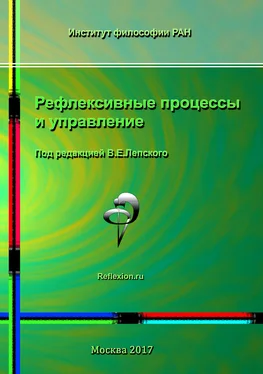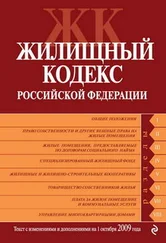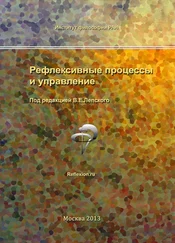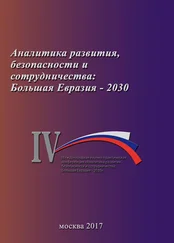The analysis of cybernetics evolution in the context of development of scientific rationality allows us to define specific traits of the second and third order cybernetics: basic philosophical approaches, basic paradigms, basic objects of control, the dominating types of activity, basic scientific approaches, basic areas of knowledge, basic types of control, basic models, basic mechanisms and technologies, basic ideas of knowledge, the dominating ethical regulators.
In post-non-classical representation cybernetics of the first, second and third order are integrated as a unity, as a uniform area of knowledge. This is achieved through the system of ontologies of the organization of self-developing reflexive-active environments.
It is important to note in this article, that the self-developing reflexive-active environment is influenced by cross-disciplinary ideas and concepts of philosophy, methodology, sociology, psychology, cybernetics, etc. Self-developing reflexive-active environment is a metasubject, which possesses invariant similar properties of subjects: purposefulness (activity), reflexivity, communicativeness, sociality, ability to develop, etc. Such environment has integrity that essentially distinguishes it from networks. This is an interaction of active elements, organized in a special way. Active elements can be created on the basis of natural intelligence (the personality, group, etc.), on the basis of artificial intelligence (agents) and also on the basis of integration of natural and artificial intelligence. The organization of interaction of active elements among themselves and with the environment in general is defined by the system of values, principles, ontologies, criteria and also by the specialized subject focused information platform (Lepskiy, 2010; 2015).
References
1. Ashby, W. R. (1956): An Introduction to Cybernetics, Chapman & Hall, London.
2. Beer, S. (1981), Brain of the Firm; Second Edition (much extended), John Wiley, London and New York.
3. Foerster, Heinz von (1974), Cybernetics of Cybernetics, Urbana Illinois, University of Illinois.
4. Lefebvre, V.A. (1982), Algebra of Conscience. Dordrecht, Holland, Reidel.
5. Lefebvre, V.A. (1967), The conflict structures, Vysshaya shkola, Moscow (in Russian).
6. Lektorski,V.A. (2001), Epistemology classical and nonclassical, "Editorial" Publishing House, Moscow (in Russian).
7. Leontiev, A. N. (1978), Activity, consciousness, and personality, Prentice-Hall, Englewood Cliffs, USA.
8. Lepskiy, V. (2015), Evolution of concepts about control (methodological and philosophical analysis, "Kogito Center" Publishing House, Moscow (in Russian)
9. Lepskiy, V. (2010), Reflexive and Active Environments of Innovative Development, "Kogito-Center" Publishing House, Moscow (in Russian).
10. Lepskiy, V. (1998), The Concept of Subject-oriented Computerization of Control Activity, Institute of Psychology RAS, Moscow (in Russian).
11. Luhmann Niklas (1982), "The World Society as a Social System". International Journal of General Systems, vol. 8, No. 1, pp. 131–138.
12. Novikov D. A. (2016), Cybernetics: from Past to Future. – Heidelberg: Springer.
13. Rubinshteyn, Sergei L. (1997), The selected philosophical-psychological works, Nauka, Moscow (in Russian).
14. Shchedrovitsky G. P. (2002) "Reflexion and Relevant Problems", Reflexive processes and control, vol.1, № 1, pp.41–45.
15. Stepin, V.S. (2003), "Self-developing systems and post-non-classical rationality", Voprosy Filosofii, No. 8, pp.5-17 (in Russian).
16. Stepin, V. (2005) Theoretical Knowledge. Springer Verlag GMBH.
17. Turchin, V.F. (1977), The Phenomenon of Science: A Cybernetic Approach to Human Evolution, Columbia University Press, New York.
18. Umpleby, Stuart A. (2014), "Second order science: logic, strategies, methods", Constructivist Foundations. Vol. 10 No. l,pp. 16–23.
19. Vernadsky V. I. (2007) Geochemistry and the Biosphere, Essays by Vladimir I. First English Translation from the 1967 Russian Edition of Selected Works, Santa Fe, NM: Synergetic Press.
20. Vygotsky L. (1981) The genesis of higher mental functions, The concept of activity in Soviet psychology. J. Wertsch (Ed.).Armonk, NY: Sharpe, pp. 144–181.
21. Wiener, Norbert (1948), Cybernetics or Control and Communication in the Animal and the Machine, Cambridge, Mass., John Wiley & Sons Inc., New York.
Stuart A. Umpleby (George Washington University, Washington)
Third order cybernetics as the evolution of society
Expanded Abstract. When the International Academy for Systems and Cybernetic Sciences met in Chengdu, China, in 2015, the theme of the conference was Systemic Solutions for Systemic Problems. It seemed to me that problems could arise on several conceptual levels. Examples of problems at the first level would be finding better ways to build roads and buildings and increasing production and improving trade. At a second level there may be problems with the theories we use to solve problems, for example if we do not have a theory or understanding of a new disease. A third level of problems lies in philosophy, for example if we do not have an adequate epistemology to guide our work with social systems, where people both observe and act, thereby experiencing and creating uncertainty. Those reflections led me to think that there is a fourth level, namely the historical experiences of societies that shape the theories and philosophies that have been invented to guide our problem solving activities. But I did not feel that I knew enough about Chinese history, culture, and philosophy to speculate on differences between East and West.
Soon thereafter Vladimir Lepskiy said that he and his colleagues in Russia were developing third order cybernetics (Lepskiy 2010, 2015a, 2015b). We quickly agreed to organize a panel of scholars from Russia and the West (the U.S. and Western Europe) to discuss these ideas. We met in January 2017 in Rome at a conference of the World Organization for Systems and Cybernetics. As I read the abstracts and papers prepared by Russian scholars, I realized that this was another example of history influencing science and philosophy in addition to science and philosophy influencing history.
The Russian scholars were saying that post non-classical cybernetics, the third stage in the development of cybernetics, would be more humanistic than previous conceptions of cybernetics. These descriptions made me think of the work of Locke, Rousseau, and Voltaire, a literature from the seventeenth century which had contributed greatly to the development of democratic ideas in the west. However, the Russians were citing more recent Russian scholars. So, I wondered whether the Russians were reinventing ideas developed earlier in other countries or were they developing important new ideas?
I interpret Lepskiy‘s topic as another version of the question, How do historical experiences in a society shape the development of its science and philosophy? This paper will focus on how societies evolve and restructure themselves by identifying problems and then designing laws and institutions and procedures to solve those problems.
Second order cybernetics, as developed in the US, focused initially on the biology of cognition. For a long time there had been a consensus among scientists that the observer should be eliminated from scientific consideration in an effort to be unbiased and objective. However, a few scientists felt that the observer could not be eliminated from science, since scientific theories are created by observers and are interpreted by other observers. To claim that the observer could and should be removed from discussion was a way of neglecting or overlooking the purposes that scientists are pursuing when they do research.
Читать дальше












